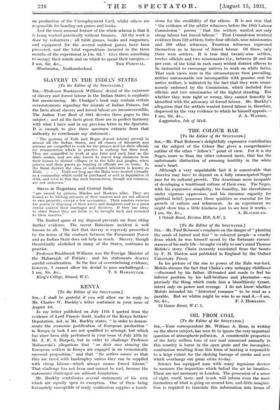KENYA
[To the Editor of the SPECTATOR.]
Sin,—I shall be grateful if you will allow me to reply to Mr. Charles W. Buckby's letter contained in your issue of August 1st.
In my letter published on July 11th I quoted from the evidence of Lord Francis Scott, leader of the Kenya Settlers' Deputation, not, as Mr. Buckby states, "in order to demon- strate the economic justification of European production" in Kenya (a task I am not qualified to attempt, but which has since been ably performed in your issue of July 25th by Mr. J. F. S. Harper), but in order to challenge Professor Malinowsld's allegations that "on their own showing the European settlers in Kenya are engaged in an economically unsound proposition," and that "the settlers assure us that they are faced with bankruptcy unless they can be supplied with cheap labour—which always means forced labour." That challenge has not been and cannot be met, because the statements challenged are without foundation.
Mr. Buckby contributes several statements of his own which are equally open to exception. One of these being fortunately susceptible of ready verification supplies a touch-
stone for the credibility of the others. It is not true that "the evidence of the settler witnesses before the 1913 Labour Commission" proves " that the settlers wanted not only cheap labour but forced labour." That Commission received evidence from 122 settlers, forty-four officials, nine missionaries and 109 other witnesses. Fourteen witnesses expressed themselves as in favour of forced labour. Of these, only three were settlers. It is true that twenty-nine settlers, twelve officials and two missionaries (i.e., between 20 and 30 per cent. of the total in each case) wished district officers to be instructed to encourage natives to work on white farms. That such views were in the circumstances then prevailing, neither unreasonable nor incompatible with genuine zeal for native welfare, is indicated by the fact that they were unani- mously endorsed by the Commission, which included four officials and two missionaries of the highest standing. But whether they were right or wrong, they cannot honestly be identified with the advocacy of forced labour. Mr. Buckby's allegation that the settlers wanted forced labour is, therefore, disproved by the very evidence to which he himself appeals.—






























 Previous page
Previous page